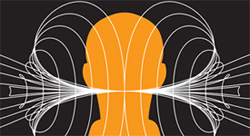In a recent article in the Harvard Business Review (Persuasion Depends Mostly on the Audience, 6.2.15), Tomas Chamorro-Premuzic, Professor of Business Psychology at University College London and a faculty member at Columbia University, explores how persuasion is emotional first and rational second. Effective persuasion, he tells us, highlights the irrationality of human thinking; “we may be living in a data-driven world, but that does not make people more logical.”
* * *
What are the main psychological forces that explain when and why we are likely to be persuaded by others? Here’s what the science shows:
1. We yield to persuasion because we cannot tolerate ambiguity. Indeed, our need for closure – the desire to maintain internal consistency between our different beliefs and behaviors – can generate abrupt attitude changes and a passionate sense of certainty.
For example, interviewers rate candidates more negatively when they have been given negative information about them beforehand; and most people would switch instantly from liking to disliking an idea when they find out that it was proposed by someone they dislike.
2. By the same token, our subconscious drive for maintaining consistent thoughts and ideas can often make us immune to persuasion even in the presence of irrevocable evidence. For instance, managers are less likely to notice mistakes in their employees when they were responsible for hiring them, because the alternative would be to admit that they were wrong, which would make them feel stupid.
The bottom line is that persuasion depends more on what we think of ourselves than what we think of the message. As Nietzsche observed: “One sticks to an opinion because he prides himself on having come to it on his own, and another because he has taken great pains to learn it and is proud to have grasped it: and so both do so out of vanity.”
3. We tend to see others as more gullible than ourselves. This so-called third-person effect is well-established and suggests that there is a comforting and ego-enhancing element in feeling more independent than our peers, and this feeling fuels our self-deception. In line with this, we are generally more capable of spotting persuasion attempts when they are directed at others than at ourselves. Even when scientists explain this to laypeople, most still see themselves as less gullible than others, much like with other better-than-average biases.
4. Few things are more persuasive than fear. With the exception of psychopaths, the most effective way to persuade people is by activating their threat-detection mechanisms. This explains why people are generally more motivated to avoid losing something they perceive they have (e.g., love, health, money) than gaining something they may want to have. “Buy this and you’ll live longer” is generally less effective than “buy this or you’ll die sooner.”
5. Persuasion is emotional first and rational second. Indeed, we are more likely to yield to persuasion in order to maintain or attain certain mood states than in order to gain knowledge or advance our thinking. When someone makes us feel good – intentionally or not – we will be more likely to agree with their views and be persuaded by them. In persuasion, warmth and empathy go a lot further than logic and evidence. It is for this reason that much of advertising targets our emotional processes.
